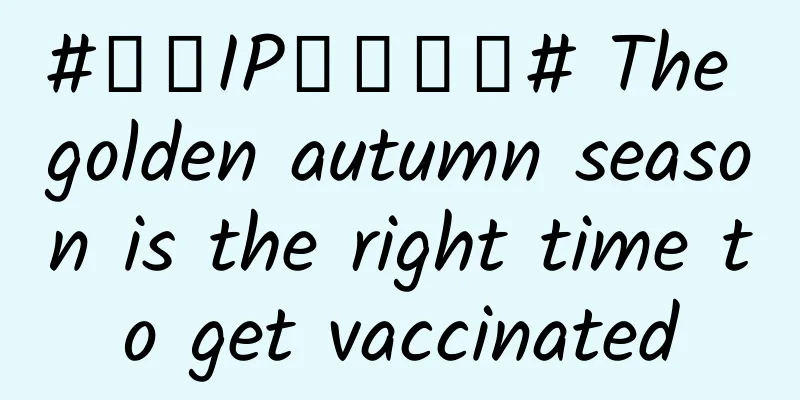#千万IP创科学普# The golden autumn season is the right time to get vaccinated

|
In autumn, the heat gradually subsides and the weather becomes more suitable. Many friends have plans to travel and have gatherings with friends and relatives. The gathering of people and the increase in the temperature difference between day and night gradually increase the risk of respiratory diseases such as influenza. Remind everyone: The best way to prevent influenza is to get vaccinated, and now is a good time to get vaccinated. What is influenza? Influenza (flu for short) refers specifically to an acute respiratory infectious disease caused by influenza virus. It is mainly transmitted through respiratory droplets when the infected person sneezes and coughs. It can also be transmitted through direct or indirect contact with the oral and nasal mucosa. For example, if your hands touch objects contaminated by the virus and then touch your mouth and nose, it can cause infection. The symptoms of influenza are usually more severe than those of the common cold. Typical clinical symptoms are high fever, body aches, significant fatigue and mild respiratory symptoms. They also last longer and are more common in autumn and winter. How to prevent influenza? 1. Get the flu vaccine in time. It is the most effective way to prevent influenza. 2. Avoid staying in crowded places for a long time and wear a mask scientifically when necessary. 3. If there are people with flu-like symptoms around you, you should keep a distance from them. 4. Pay attention to maintaining indoor air circulation, open windows for ventilation, cover your mouth and nose with a handkerchief or tissue when sneezing or coughing to avoid droplets contaminating others. 5. Pay attention to personal hygiene and wash your hands frequently. Who needs to be vaccinated? At present, the priority groups recommended for influenza vaccination in my country include: ① Medical personnel; ② Elderly people aged 60 and above; ③ Those suffering from one or more chronic diseases; ④ Vulnerable people and employees in places where people gather, such as nursing homes, long-term care institutions, and welfare homes; ⑤ Pregnant women; ⑥ Children aged 6 to 59 months; ⑦ Family members and caregivers of infants under 6 months old; ⑧ People in key places (such as staff of childcare institutions, primary and secondary schools, and supervision places). What are the different flu vaccines? At present, the influenza vaccines approved for marketing in my country are roughly divided into the following categories: 1. Trivalent inactivated influenza vaccine (IIV3), which is further divided into split vaccine and subunit vaccine; 2. Quadrivalent inactivated influenza vaccine (IIV4), which is further divided into split vaccine and subunit vaccine; 3.Trivalent live attenuated vaccine (LAIV3). In the absence of contraindications, the above vaccines are safe and effective, with the main differences being in two aspects: 1. The difference between "vaccine types" is that there are inactivated and attenuated vaccines. The pathogens in inactivated vaccines have been killed and are no longer pathogenic; the pathogens in attenuated live vaccines have been specially treated to reduce their toxicity. Both can effectively trigger the body's immune response. 2. The difference in "valence" is that there are trivalent and quadrivalent vaccines. There are four most common viruses that cause seasonal influenza in humans, namely the H1N1 and H3N2 subtypes of influenza A, and the Yamagata and Victoria lineages of influenza B. Compared with the trivalent vaccine, the quadrivalent influenza vaccine has the Yamagata lineage of influenza B (which can be simply understood as preventing this lineage). How long will the immune effect last after vaccination? It usually takes 2 to 4 weeks for protective levels of antibodies to be produced after receiving the flu vaccine, so it is best to complete the vaccination before the epidemic season arrives. Studies have shown that the antibody levels induced by various vaccine strains reach a peak one month after influenza vaccination, and begin to decline around three months. However, even with the decline, the antibody levels are still higher than the baseline until six months after vaccination. This shows that the antibody protection level after influenza vaccination can be maintained for at least six months. The serum antibody level in the body is significantly reduced one year after vaccination. Quanzhou CDC reminds: After a person is infected with influenza virus or vaccinated with influenza vaccine, the immunity acquired will decay over time. The degree of decay is related to age, physical condition, vaccine antigen and other factors. It is recommended that citizens get the influenza vaccine every year. However, in the same influenza epidemic season, people who have completed the full vaccination according to the vaccination procedure do not need to be vaccinated again. |
<<: Pay attention to scoliosis and help children avoid detours
>>: [Health Lecture] How should the diet of the elderly be adjusted?
Recommend
Can drinking milk before bed really help you sleep better? After reading this, I realized that I have been drinking it for nothing for so many years
Vision丨Song Lidan Consulting Engineer, Industrial...
How long after a miscarriage can a woman take a shower?
If a woman has a miscarriage, her body will becom...
The girl's sweat is actually blue. What causes chromhidrosis?
Science Fiction Network, March 14 (Qin Yingying) ...
What is sarcopenia in the elderly? What foods are good for the elderly with sarcopenia?
We often see some elderly grandparents who are ve...
Why is the vaginal discharge before menstruation like tofu residue?
Problems with leucorrhea are relatively common di...
Is breast fibroid type 3 serious?
Women over the age of 35 should have regular brea...
Six types of aging agents that women must be careful of
Women tend to look old because there are many thi...
Pictures of parasites on women
I believe that everyone is familiar with diseases...
Wahaha Chairman Zong Qinghou died of lung cancer. How many steps does it take for lung nodules to develop into lung cancer?
Recently, Wahaha officially released an obituary,...
What causes nausea and vomiting during confinement?
After giving birth, women are very weak and need ...
What does a positive urine test mean for women?
Usually, when people get sick and go to the hospi...
Stomach pain after menstruation
Many female friends experience dull abdominal pai...
Can I get pregnant one month after having an abortion?
Terminating a pregnancy by human or medical means...
Women will face such health crisis after marriage
After a woman gets married, some changes will occ...
How many days after taking Diane 35 will menstruation come?
Menstrual irregularity is a problem that most wom...









